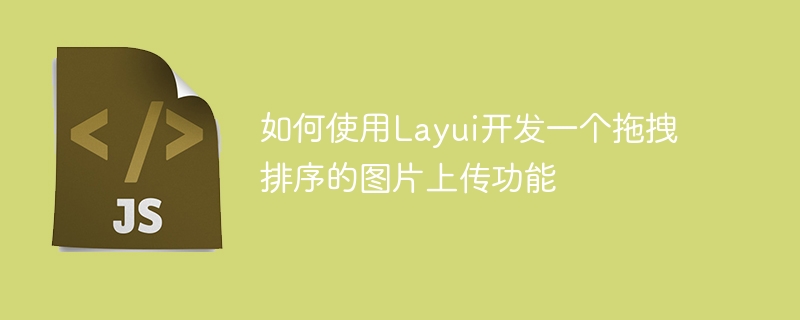Home >Web Front-end >JS Tutorial >How to use Layui to develop a drag-and-drop sorting image upload function
How to use Layui to develop a drag-and-drop sorting image upload function
- 王林Original
- 2023-10-26 09:03:401030browse

How to use Layui to develop a drag-and-drop sorting image upload function
Introduction:
In today's Internet era, image uploading has become a part of our daily life One of the common requirements. In the actual development process, the drag-and-drop sorting function can not only improve the user experience for image uploading, but also effectively manage the sorting of images. Layui is a simple and easy-to-use front-end UI framework based on Nodejs. It provides powerful functions and rich styles, and is very suitable for developing drag-and-drop sorting image upload functions.
This article will introduce how to use Layui to develop a drag-and-drop sorting image upload function, and provide specific code examples to facilitate practical application.
- Preparation:
First, we need to ensure that the relevant files of Layui have been introduced. In the code, we need to use the two files layui.js and layui.css. If these files have not been introduced, you can download and introduce them from Layui's official website. - HTML layout:
Next, we need to perform HTML layout and create an area for displaying uploaded images, including a div for displaying a list of uploaded images and a div for drag and drop upload Area.
<div class="upload-container">
<div class="uploaded-list" id="uploaded-list"></div>
<div class="drop-area">
<div class="drop-text">将图片拖拽到此处上传</div>
<div class="upload-button">点击上传图片</div>
<input type="file" id="file-input" multiple="multiple" style="display: none;">
</div>
</div>- CSS styles:
In order to beautify the page and implement the drag-and-drop upload function, we need to write some CSS styles. The following is a sample style:
.upload-container {
width: 500px;
margin: 0 auto;
padding: 20px;
box-sizing: border-box;
}
.uploaded-list {
margin-bottom: 20px;
}
.drop-area {
border: 1px dashed #ccc;
height: 200px;
text-align: center;
line-height: 200px;
background: #f7f7f7;
cursor: pointer;
position: relative;
}
.drop-text {
color: #999;
}
.upload-button {
position: absolute;
top: 0;
left: 0;
width: 100%;
height: 100%;
text-align: center;
line-height: 200px;
cursor: pointer;
background: rgba(0, 0, 0, 0.5);
color: #fff;
display: none;
}
.upload-button:hover {
background: rgba(0, 0, 0, 0.7);
}- JavaScript code:
The last step is to write JavaScript code, using Layui’s upload module and drag and drop functionality. The following is a sample code:
<script>
layui.use('upload', function(){
var upload = layui.upload;
//执行实例
var uploadInst = upload.render({
elem: '#file-input', //绑定元素
url: '/upload', //上传接口
data: {}, //可选项,额外的参数
multiple: true, //是否允许多文件上传
done: function(res){
//上传完毕回调
console.log(res);
},
error: function(){
//请求异常回调
}
});
//拖拽上传
var dropArea = document.querySelector('.drop-area');
var uploadButton = document.querySelector('.upload-button');
var fileInput = document.querySelector('#file-input');
dropArea.addEventListener('dragover', function(e) {
e.preventDefault();
this.classList.add('highlight');
});
dropArea.addEventListener('dragleave', function(e) {
e.preventDefault();
this.classList.remove('highlight');
});
dropArea.addEventListener('drop', function(e) {
e.preventDefault();
this.classList.remove('highlight');
fileInput.files = e.dataTransfer.files;
uploadButton.click();
});
//显示已上传的图片
uploadInst.config.done = function(res) {
var uploadedList = document.querySelector('.uploaded-list');
var img = document.createElement('img');
img.src = res.url;
uploadedList.appendChild(img);
};
});
</script>Code description:
- First, introduce Layui through layui.use('upload', function(){...}) Upload module.
- In the upload module, create an instance through upload.render({...}), where elem represents the bound element, url represents the upload interface, data represents additional parameters, and multiple represents whether it is allowed. Multiple file upload.
- In the done callback function, you can handle the logic after the upload is completed. In this example, the upload results are printed through console.log(res).
- In the drag and drop upload function, monitor the dragover, dragleave and drop events, implement style switching when dragging files to the upload area respectively, and assign the dragged file to input[type="file"] element, and finally call uploadButton.click() to trigger the upload operation.
- Finally, display the uploaded image through the uploadInst.config.done function. In this example, we create an img element and set res.url as src for it, then add the element to the uploadedList.
Summary:
It is not difficult to develop a drag-and-drop sorting image upload function using Layui. You only need to prepare the corresponding HTML layout, CSS style and JavaScript code. Through Layui's upload module and drag-and-drop function, we can easily implement drag-and-drop upload and display uploaded images. I hope my sharing can be helpful to you, thank you for reading!
The above is the detailed content of How to use Layui to develop a drag-and-drop sorting image upload function. For more information, please follow other related articles on the PHP Chinese website!
Related articles
See more- An in-depth analysis of the Bootstrap list group component
- Detailed explanation of JavaScript function currying
- Complete example of JS password generation and strength detection (with demo source code download)
- Angularjs integrates WeChat UI (weui)
- How to quickly switch between Traditional Chinese and Simplified Chinese with JavaScript and the trick for websites to support switching between Simplified and Traditional Chinese_javascript skills

